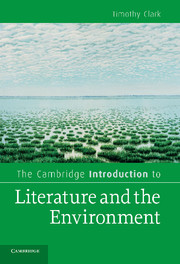Science and the struggle for intellectual authority
Published online by Cambridge University Press: 05 June 2012
Summary
The relation of ecocriticism to the natural sciences is uniquely close, for unlike most political movements environmentalism claims a scientific basis. Green arguments often rest on the authority of scientific modelling and prediction. Science is also an ally in critiques of the illusory self-sufficiency of the cultural or of notions of ‘nature’ as mere cultural construction. The timeframes of geology or intimate studies of lives of other creatures undermine at a stroke any narrowly human-centred perspective on things.
At the same time ecocritics are often profoundly critical of the institutions of science. Science has become deeply implicated in techno-industrial society as both a practice and as an ideology. The growth of reform environmentalism has also seen the increasing co-opting of scientists into systems of global surveillance in not always comfortable ways.
Other critics challenge the basic assumptions that underlie the scientific claim to an exclusive understanding of reality through causal, material laws to be formalised mathematically. Scientific notions of ‘objectivity’ are accused of having unjustly discredited other modes of understanding and of having generally drained all ethical, spiritual and even aesthetic value from the world.
Sometimes, however, science appears in rather caricature forms. The multiplicitous work of scientists gets identified with a kind of totalitarian monolith whose aim is simply the domination of nature, for which all knowledge is a mode of power, and which threatens every remaining island of subjective freedom and individual responsibility with modes of administrative procedure.
- Type
- Chapter
- Information
- The Cambridge Introduction to Literature and the Environment , pp. 141 - 142Publisher: Cambridge University PressPrint publication year: 2011



